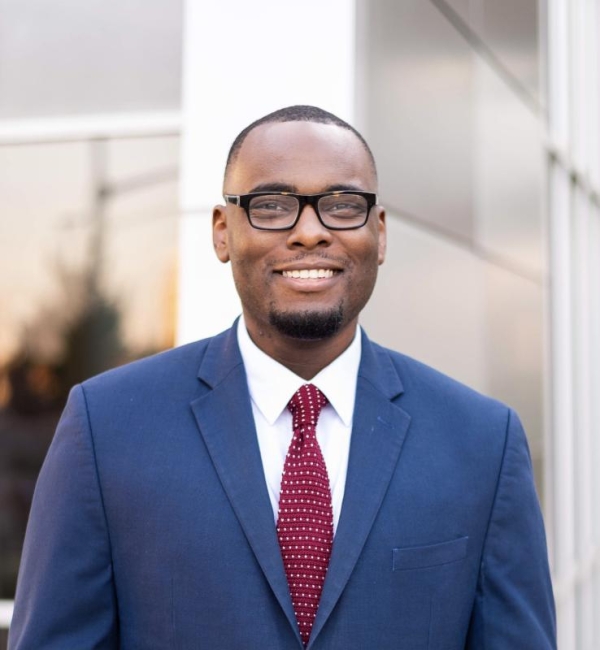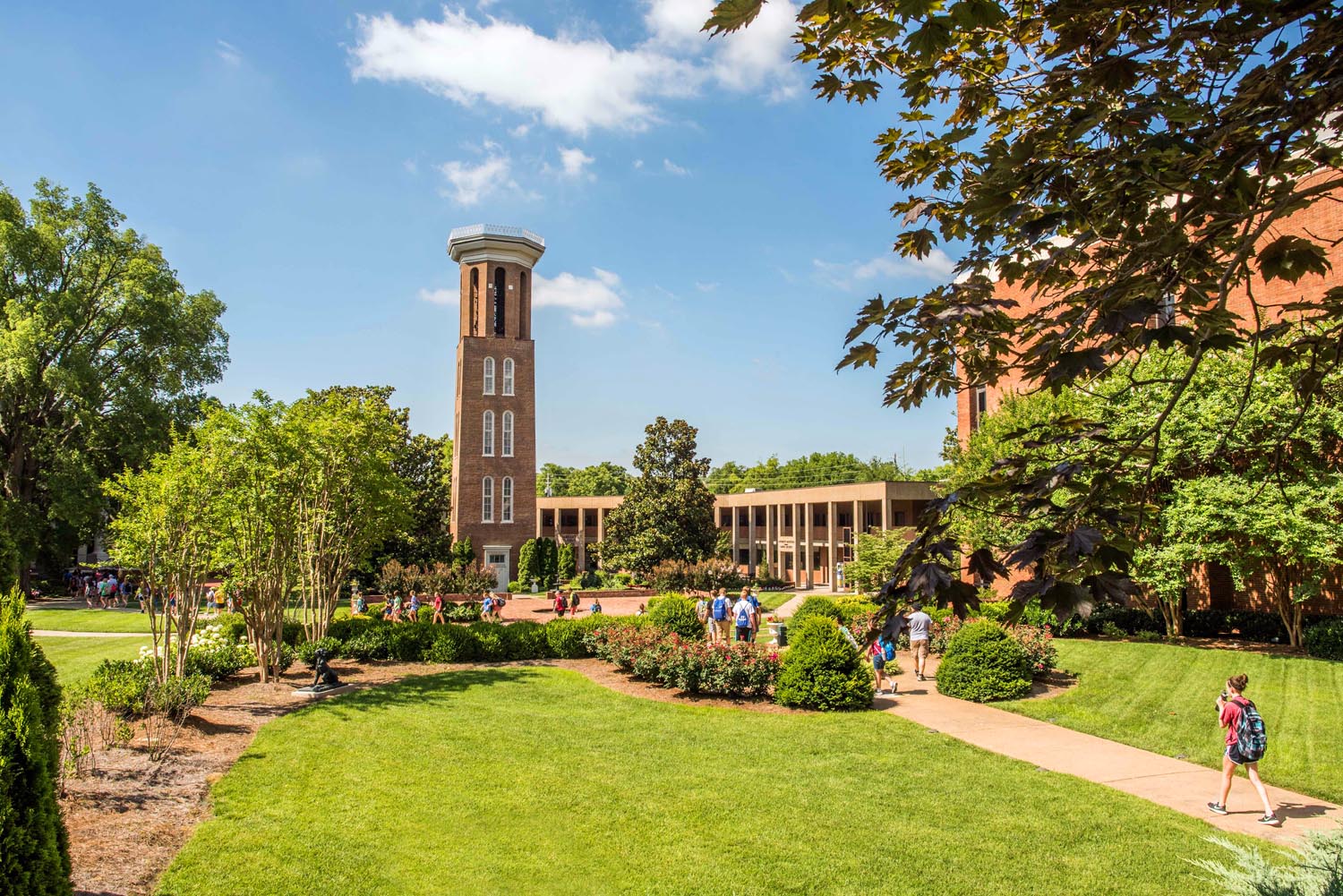You have /5 articles left.
Sign up for a free account or log in.

D’Angelo Taylor, incoming vice president of hope, unity and belonging at Belmont University
Belmont University
D’Angelo Taylor had a hard time imagining a career in higher education. Growing up in a tough neighborhood on the south side of Richmond, Va., he assumed his career options were limited.
No one in his family had gone to college, much less earned an advanced degree. But Taylor, raised by a grandmother who encouraged him to dream big and to follow the educational path that would make those dreams come true, ended up doing both. He now has a Ph.D. in educational leadership from the University of New England that he earned after getting a bachelor’s degree in political science and government and a master’s degree from Western Illinois University.
“Hopefully this gives someone, whether in my family, or the neighborhood where I grew up, or someone I’ve impacted in my educational career, the opportunity to say, ‘If D’Angelo can do it, so can I,’” he said.
Taylor will now be relying on his professional and lived experiences to inform how he approaches his work as vice president of hope, unity and belonging at Belmont University, a Christian institution in Nashville, Tenn.
He will start in the newly created role on May 1, and it will be housed in Belmont’s Office of Hope, Unity and Belonging (HUB), which opened last September.
“One of the things that my grandmother always taught me was that whether it be educationally or economically, we can overcome any adversity,” he said. “Her pushing me is why I ended up where I am today.”
That lesson remained with him throughout his college years and as he went about building his professional career. When he learned of the opening for the new position at Belmont, the use of the word “hope” in the job title stood out to him.
“So as I’m reading this title, ‘Hope, Unity and Belonging,’ I think about how it all weaves together and how we unite around that hope that things can be better than what they are,” he said.
While Taylor will be working to help the students feel comfortable on campus, he also wants the HUB to provide programming that goes beyond holding cultural events for Hispanic Heritage Month or Black History Month, for instance.
“I want everyone to feel as if their lived experience is represented, no matter how you identify, no matter what your faith is, no matter where you come from. I want to try to capture that within the HUB,” he said.

Taylor is currently vice president of student affairs at Central State University, the only public historically Black college or university in Ohio. He was previously associate director of the multicultural center at the University of Southern Indiana, where he built partnerships across the institution and with numerous local community programs.
Taylor says he doesn’t anticipate a difficult transition going from an HBCU to a predominantly white institution, or PWI, because he has worked at both types of colleges. He’s excited about what he can accomplish at Belmont.
“I think that this new role will not be boxed in but allows for someone like me, who is a creative individual, to actually go ahead and start expanding even what the job description says,” he said.
Living in both rural and urban environments has allowed Taylor to witness the adversities experienced by different groups of people and helped him better understand his students’ backgrounds and how to help them individually.
“Growing up, I only thought that poor, urban cities existed and it was just poor people that were in my space,” Taylor said. “But when I started working in west central Illinois, I saw that poor folks existed in rural spaces and there was economic inequality there as well.”
When Belmont administrators were developing the job description for the new position, L. Gregory Jones, the university’s president, wanted someone who would bring a certain set of skills to the institution, which had 7,384 undergraduates attending in 2022. One of Jones’s first priorities when he arrived at Belmont in 2021 was for campus stakeholders to look deeper at the university’s identity as an institution and come up with ideas that reflected its values and mission.
“I thought a Christ-centered university ought to go deeper than other universities do and try to address questions of diversity, equity and inclusion, and belonging,” he said.
Jones believed Taylor was the perfect candidate for the position and that his leadership skills and his background mentoring and working with students from diverse backgrounds would draw people to him. Jones said he looked for applicants who were “great listeners,” not just great talkers, during the interview process.
Taylor had also served as the director of the Collegiate Men of Distinction Mentoring Program, which is designed to foster the growth, development, retention and graduation of Black male students. Taylor created a curriculum to enhance retention and graduation rates among Black men and did his doctoral dissertation on the efficacy and limits of the program. He is a 2021 recipient of the Evansville Rotary Club’s 20 Under 40 Award, which is given to individuals who have shown leadership in serving their communities, and the 2021 Social Change Award at the University of Southern Indiana.
Taylor’s work at Belmont’s HUB will be dedicated to diversity, equity, inclusion and belonging initiatives. He and his team will be responsible for managing Title IX compliance and sexual misconduct prevention and all nondiscrimination and equity work. He will oversee the office and its staff members, including the director of institutional equity and Title IX coordinator and a new equity compliance specialist.
“When you talk about the work of diversity, equity and inclusion, I think that we start from the premise that everyone … deserves to have a place where they belong,” Taylor said.
It was with those goals in mind that Belmont administrators, faculty and staff members, and students got together in the first half of 2022 to map out the vision for the institution’s values, mission and goals by 2030. They created five pathways for helping students become whole persons by developing character, wisdom and “a transformational mind-set”; embracing hope and inclusivity to reweave the social fabric, “which is frayed, tattered and torn”; engaging in storytelling that inspires others and “connects us to one another”; implementing an integrative approach to health and wellness; and embracing the call “to love thy neighbor” in theory and in practice by pursuing data-informed social innovation.
“Cultivating hope and inclusive excellence to help reweave the social fabric is an integral feature, and it’s connected to the other pathways and this role,” Jones said of Taylor’s mandate.
Other initiatives at Belmont include a recent collaboration with Fisk University, a historically Black liberal arts college in Nashville, to promote social justice through “exposure to civil rights and social justice movements across Middle Tennessee.”
“It will bring students from a historically Black school to connect to students at a historically predominantly white school together to focus on education, learning and impact in the Nashville community and beyond,” Jones said. “Those sorts of networks and relationships are an integral part of what we’re trying to do over all as a university.”
Taylor said he believes diversity, equity and inclusion are centered around having hope. He said that whether it’s with personal, professional or financial goals, people need hope to ensure they’re moving forward.
Jones also described “hope” as not only about being optimistic, but, in a deeper sense, it is to acknowledge “the brokenness of the past, the complexity of the present and to be inspired to work towards inclusive excellence and change in the future.”




